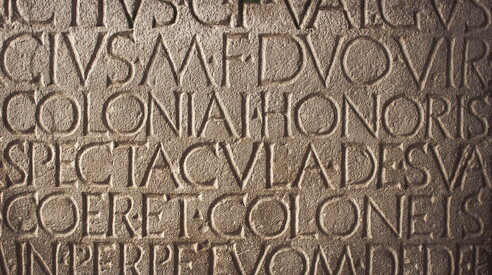A new lease of life for epigraphs thanks to AI


Photo by Jametlene Reskp on Unsplash
A bunch of books - overbooking
To fill in the gaps, artificial intelligence allows us to draw on a database of over two hundred thousand Latin inscriptions, a vast amount that no human specialist can possibly keep track of. A step forward for classical studies, but also for those who will study them two thousand years from now.
On the same topic:
It's a period of extraordinary flourishing for classical studies, thanks to artificial intelligence, or better yet, the fruitful fusion (I'm speaking abroad) between humanistic culture and technological research. Last week, Nature gave great prominence to Aeneas, an AI that allows the reconstruction of gaps in Latin epigraphs by drawing on a database of over two hundred thousand known specimens, a mass that no human specialist can keep track of . In 2022, the same journal featured a similar AI on its cover, dedicated to Greek epigraphs and designed by the same team, a partnership between the University of Nottingham, Oxford, and Google's Deep Mind; a remarkable achievement for a science that was once thought confined to the dustiest recesses of museums. Interviewed by the Guardian, the classicist who designed Aeneas, Thea Sommerschield, underlined the importance of AI in giving voice to the forgotten social groups of the past , the subaltern classes who did not have access to the production of books that have come down to us across the millennia to bear witness to a history written by the victors.
On epigraphs, however, more people had the right to speak, and thanks to AI, we can accurately investigate the lexical and conceptual nuances of an otherwise lost Latinity. I think he also grasped a fundamental aspect of the relationship between AI and written production. If Aeneas was able to ensure enormous progress in Latin epigraphy, it was precisely because epigraphs were commissioned even by uneducated and, above all, uncreative classes; similarly, for example, in two thousand years, AI will have an easy time reconstructing what we post on social media, precisely because there's no need to be geniuses to do so; we limit ourselves to mechanically replicable clichés . What an amateur writes is what AI could write directly, whether it's an epigraph or a commentary on a story. It would be impossible for AI, however, to reconstruct the missing part of an original work, such as the second book of the Poetics or the gaps in the Satyricon, precisely because Aristotle and Petronius did not belong to the vast class of non-writers.
More on these topics:
ilmanifesto





